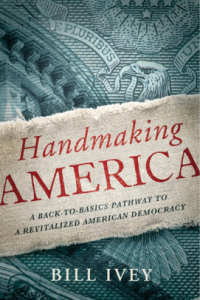 National Arts Strategies is an apolitical organization, so this review about an unashamedly liberal and progressive book is a little off the beaten track for us. But I think that every arts leader in America, whatever your political leanings, should read Bill Ivey’s latest offering: Handmaking America. In this beautifully written revisitation to the roots of progressivism in America, Ivey reminds us all of the extraordinary value that arts and culture have in shaping a meaningful personal and civic life, and the role we all could play in creating a more “civil” and equitable civil society.
National Arts Strategies is an apolitical organization, so this review about an unashamedly liberal and progressive book is a little off the beaten track for us. But I think that every arts leader in America, whatever your political leanings, should read Bill Ivey’s latest offering: Handmaking America. In this beautifully written revisitation to the roots of progressivism in America, Ivey reminds us all of the extraordinary value that arts and culture have in shaping a meaningful personal and civic life, and the role we all could play in creating a more “civil” and equitable civil society.
Much of the book is not specifically about arts and culture, but rather about the erosion of an inspiring and broadly-held national vision and narrative. Ivey has some insightful thoughts about what we can do to reverse this erosion and his thinking in places has much in common with Martha Nussbaum and her profound reflections on the humanities as an essential training ground for good citizenship.[1] Like Nussbaum, Ivey reminds us that arts and culture offer the greatest of joy but also help us develop and improve the high-level critical thinking that we need if we are to participate effectively in positive social change and structures.
Ivey’s book illustrates that the arts tell stories that encompass big ideas, and in a time when our political imagination seems weak, arts and culture can strengthen this collective muscle. It’s the ultimate instrumental argument for our field and harkens back to John Dewey, but Ivey’s call for engagement in an expressive life as a way of rediscovering American optimism is much more than a paean to the golden olden days. He vividly describes how arts and culture offer an antidote to both the increasing task mechanization in our perpetual workdays and the impersonalization of mass marketing. In fearless language he defines the state we are in and the problems we must overcome – it’s worth reading the book for his exposition on how excesses consumerism tarnishes our lives: “The pursuit of happiness through debt-enabled consuming is a national pathology.”
Ivey joins Nussbaum and Peter Whybrow[2] in an honest assessment of how American life can be better, and aligns the potential of a new push for an imaginative vision including participation in arts, culture and craftsmanship with a political reordering like the Arts and Crafts movement in 19th Century England.
As arts leaders, we grind through the endless race for resources and credibility with extraordinary energy. It’s nice to read something that reminds us how much we matter in the bigger picture – whether you agree or disagree with Ivey’s politics I’m betting you will enjoy his writing and his perspective as a lifelong cultural leader and a “cautious capitalist.”

Leave a Reply